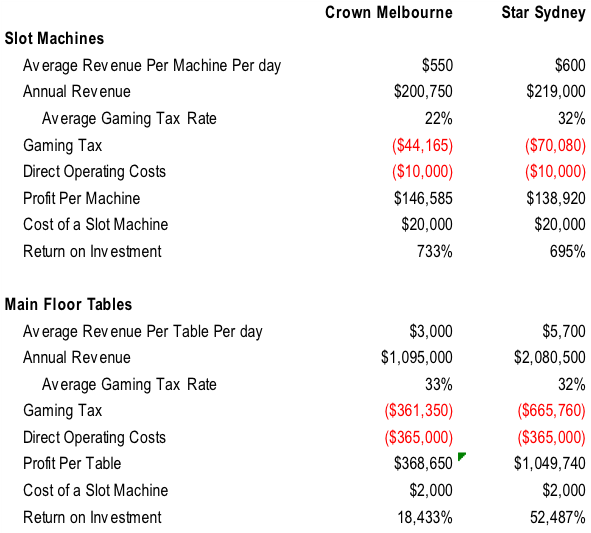Could a regulatory change affect Crown and Star Casinos?
It is pretty easy to see why regulation is required to restrict a rapid expansion of gaming supply in the market. The table below maps the rough return on capital Crown and Star generate on the physical capital invested in slot machines and main floor casino tables at their Melbourne and Sydney casinos.
Clearly the economic return on an incremental slot machine or table would be an attractive incremental investment for pretty much any entertainment venue.
Governments will generally require gaming operators to pay a licence fee as well as invest a certain amount of capital in lower return infrastructure and entertainment facilities, which dilutes the return on capital from the gaming capacity, resulting in a more acceptable return for the casino on an average basis.
At the same time, governments will protect the gaming operators from competition by restricting or preventing new capacity and competitors from entering the market given the social cost of unfettered access to gaming.
While this regulatory barrier to entry can allow a gaming operator to generate a strong return on capital, there is a danger in extrapolating this return on capital into perpetuity due to the potential for governments to change regulations over time.
The gaming industry is littered with instances of changes to regulatory barriers to entry and market structures that have materially impacted the valuation of existing operators. These include the Victorian gaming market structure change announced in 2008, the special project licence granted to Crown in Sydney, the new casino licence tendering processes in QLD, and the licensing of wagering operators on low/negligible tax rates by the NT Government.
More recently we have seen both the Crown and Star Entertainment share prices negatively impacted by the Chinese Government’s latest crackdown on corruption. The arrest of Crown employees in China could have a significant impact on the ability of Australian casinos to attract Chinese customers to their VIP facilities.
While the initial focus will be on the impact on VIP revenue at the existing operations, these companies also have a significant amount of capital invested in their facilities to service this market, which will continue to require ongoing investment to remain regionally competitive.
Additionally, Crown and Star have committed to large investments in new facilities. This potentially places the companies in a bind given commitments to governments regarding these investments, which was tied to the decision to grant new licences. This spend was at least in part based on an expected volume of international VIP revenue. If this business case needs to be revised, can the casino companies adjust their capital expenditure plans to compensate without jeopardising the new licences, or will they need to press on with the investment despite the potential for a diminished return?
Contributed by Montgomery Investment Management: (VIEW LINK)
1 topic
2 stocks mentioned


